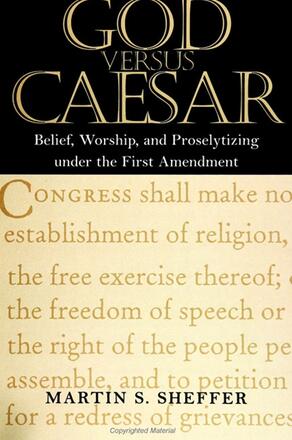
God Versus Caesar
Belief, Worship, and Proselytizing under the First Amendment
Alternative formats available from:
Reviews the judicial development of the free exercise of religion clause.
Description
God Versus Caesar reviews and analyses the judicial development of the free exercise of religion clause, from its protection for belief and certain forms of worship to its guarantee of religiously motivated behavior. This book also provides guidelines for the future direction of judicial review in free exercise cases and examines law as it develops in response to changing social values and policy. Sheffer answers how, where, and why lines are drawn between the guarantee of free exercise of religion and the right of society to protect its citizens from activity injurious to their health, welfare, safety, and morals.
Martin S. Sheffer is the author of Presidential Power: Case Studies in the Use of the Opinions of the Attorney General and is Professor Emeritus of Political Science at Tuskegee University.
Reviews
"Sheffer's book, while certainly of scholarly interest, will be of great use to students of church–state studies wishing to analyze First Amendment issues in the Court today. " — Journal of Church and State
"…provides an excellent example to public law scholars of how to conduct research in a discipline that increasingly tends not to recognize and reward that which cannot be quantified by numbers. " — The Law and Politics Book Review
"Sheffer stresses the centrality of free exercise of religion in a free society. In discussing cases concerning conscientious objection, the author is particularly adept at bringing out inconsistencies in the law and showing the implications of those inconsistencies for a free society.
"Given changes in the Supreme Court over the past thirty-five years, this topic is very significant, both in itself and as part of constitutional law. The relationship between religion and politics is as uneasy as ever and this book advances understanding of it. Moreover, the Supreme Court is currently both sharply divided on free exercise questions and uncertain of where to go in the future. By putting the Court's record in this area into historical and analytical perspective, a book such as this arrives at a very propitious time. " — Gerard J. Fitzpatrick, Ursinus College
"God Versus Caesar is as interesting to read as it is impressive as scholarship. Sheffer's research strikes me as being impeccable. His discussion of cases is most complete, and, at the same time, does not become at all tiresome. " — Francis Graham Lee, Saint Joseph's University